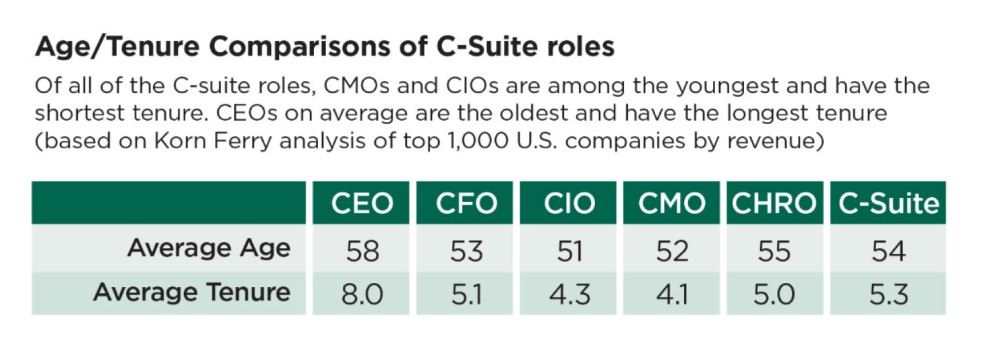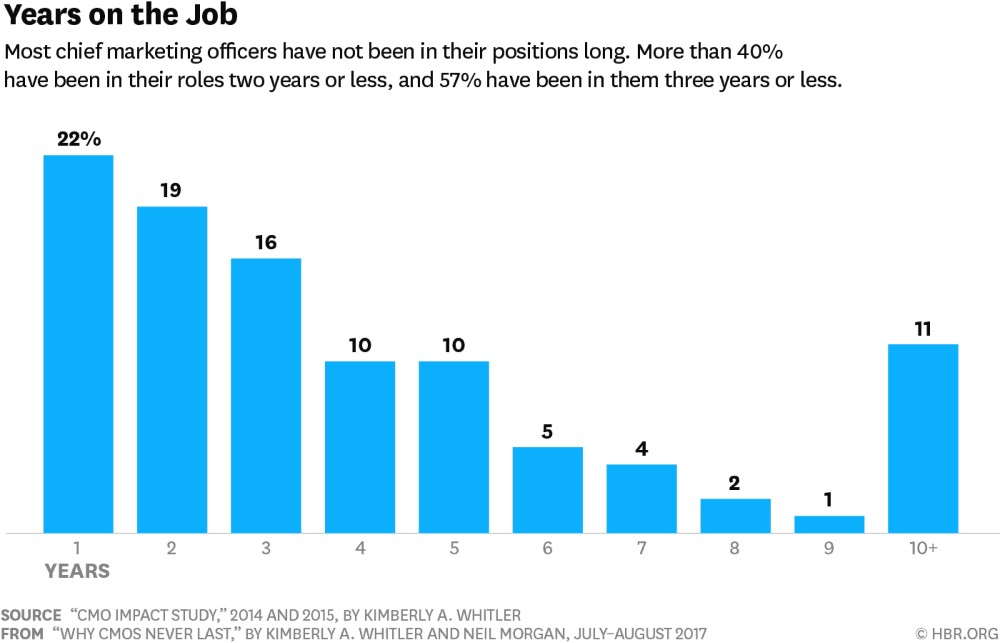The Tide of Marketing Manager Firings & Proposed Course of Action for SMBs

With the proliferation of social media sites, smartphones, big data tools, and the like, today should be the marketing’s golden age – actually, it’s never been easier to understand and reach customers. Nevertheless, it seems like it’s never been easier for marketing managers to get sidelined.
In fact, 2019 witnessed a record number of top marketers being fired: The CMO brand is under attack; and more and more marketers are losing C-suite traction. Belkin, Beats, Citi, Coty, Cisco, Dropbox, EY, GAP, GNC, Intuit, Hitachi, JC Penney, Johnson & Johnson, Kellogg’s, Kimberly-Clark, Kraft Heinz, Lyft, Marriott, McDonald’s, Mitsubishi Motors, Mondelēz International, Netflix, Nissan, PayPal, Rite Aid, Samsung, Sephora, Subway, Suntory, Spotify, Taco Bell, Ticketmaster, Tyson, Uber, Walgreens, Wendy’s – these are just a few brands from consultancy firm Spencer Stuart’s latest CMO movements list (‘” movement” refers to their term for firing). And regardless of whether you’re aware or not, such a reality is somehow intimidating!
But, what are the key reasons why several marketing managers get fired? Why are marketing managers always the first to go, compared to other top executives? And once you arrived at the decision of firing an incompetent marketing manager, how should you look for a new one that’ll deliver better results? Let’s go explore!
The Tide of CMO/Marketing Managers Firings & Top Reasons Behind
According to a C-suite study by search firm Korn Ferry, top marketers are the first to fall off the C-suite cliff, staying half as long as their bosses. It was particularly found out that the average CMO in U.S. firms leaves after just 4.1 years, whereas his or her boss, the CEO, stays around for eight. No other C-suite executive gets fired (or decides to leave) more often.

Additionally, the research by HBM indicated that churn rates may be even worse: it was revealed that staggeringly 57% of CMOs have been in their position three years or less.

When discussing such an intimidatingly short tenure of CMOs, Korn Ferry expert Caren Fleit explained, “Today’s customer-centric CMO role is exceptionally complex and requires the right balance of left as well as right-brain skills, and, very importantly, a differentiated set of leadership competencies … In some cases, short tenure can be attributed to the organization not being well aligned behind the change that the CMO is tasked with leading.”
Frankly speaking, the list of CMO challenges is long. Whereas digitalization trends have made tactical marketing activities more measurable, the pressure lies on how to evaluate and prove everything, which is obviously even more challenging when it comes to long-term marketing effects.
Beyond any doubt, the traditional lines of responsibility for a CMO or a marketing manager are blurring. In this day and age, customer data, insights, and issues seem to pop up everywhere across the organization and it’s often quite vague as to who truly owns what. This issue, together with the massive growth pressure in saturated markets, explains why the CMO role becomes tougher and tougher every single day.
Given the fore-mentioned hurdles, there exists one particular problem that stands out as the primary reason why CMOs are always the first to go: the lack of alignment between CMOs and the rest of the C-suite, especially the CEOs. In fact, a global survey by the Fournaise Marketing Group did highlight the tensions between them: The results reveal that whoppingly 80% of CEOs don’t trust or are unimpressed with their CMOs – in comparison, only 10% of the same CEOs feel that way about their CFOs and CIOs.
In addition to this troubled relationship between CEOs and CMOs, the death ratio for several talented CMOs may be attributed to their low visibility to high-risk accountability. To put simply, many CMOs have no or very vague visibility into their marketing activities or campaigns, and also have no technology to unify their organizations.
What does that mean? Let’s imagine, when a sales employee gets to their desk in the morning, they will typically log in to Salesforce. Similarly, an engineer logs into Jira or Github, a finance employee boots up NetSuite or Oracle Finance, while an HR person checks into an HRIS system. In contrast, rarely any CMO or marketer wakes up in the morning and start thinking: “I need a marketing operating system.”
In the meantime, marketing departments, despite their inefficiencies, have experienced growing importance to the bottom line of every SMB. Not so long ago, marketers were regarded as the “arts-and-crafts” people who sat in the corner and worked on pretty pictures – and in a relatively short time, such a stereotype has been turned on its head as expectations have grown for marketing to be a key engine of growth and data-driven insight.
Notwithstanding that, when asked if they know the top campaigns that are running in all of their key markets, some marketing managers actually have no idea. And this is the reason why: They are flying blind all while being expected to pilot through death-defying maneuvers to position companies to rocket ship-style growth.
Not only are some marketing managers undermined by the lack of visibility, the proliferation of disparate tools means that they spend too much time doing “work about work.” A recent survey by management consulting firm McKinsey found that nearly 60 percent of the marketer’s time in the office goes to tasks such as status updates, meetings, updating spreadsheets, and managing their email inboxes. In other words, marketers spend more time on organizational tasks than they do on their main purpose – bringing to market amazing products that will change the world.
After all, the big question comes down to, as a business owner, should you fire for your marketing manager for … incompetence? Obviously, the answer should be “yes”- it makes no sense that you burn a large amount of money on someone who rarely add any practical value to your success – especially when you’re working on tight budget. Yet, the most critical concern here does just not lie in whether you should keep your marketing manager or not, but how you can, without any delay, make up for his/her movement.
How to Find the Perfect New Marketing Manager for Your Small Business
Everybody knows CMOs don’t last long, but around recent years, things have got worse. “Transitions are happening at an unprecedented rate,” according to Spencer Stuart consultants.
Beyond any doubt, marketing managers’ failure is a big issue, not just for the marketing managers but for the company, too. Should the marketing managers fail in making the businesses customer-focused, its long-term prospects will suffer. Plus, if marketing managers move on, they may take years of customer understanding, new product ideas, and growth strategies with them.
To fill out such a marketing gap, it’s essential that SMB owner invests time finding a new marketing manager. Yet, what’s even more than essential is to make huge efforts looking for the one who accomplishes essential qualities – not to repeat the mistakes of the old ones and be able to reenergize your business!
Whereas there exists a myriad of desirable qualifications for an ideal marketing manager, below are the most critical attributes the next marketing manager “must” have to ignite your SMB’s profitability.
#1. Thinking Strategically to Align the Marketing Plan with the Company’s Business Goals.
A great marketing manager should be the one who can come up with a strategic marketing plan, no matter what industry you are in or verticals you are targeting. Besides conducting adequate research about your business to know what you’re doing, the new marketing manager should always take your business goals into great consideration and make the best attempts to craft a marketing plan that empowers you to achieve them.
#2. Boasting the Tactical Skills To Execute An Integrated Marketing Plan
There goes without saying that an adept marketing manager should not only know how to plan but also know how to execute the plan. to put in another way, he or she is required to obtain the essential experience and knowledge to get the plan off the ground and carry it out.
Suffice to say, your would-be marketing manager should be ready to get into the trenches with their team and make any plan work. Of course, they don’t have to be able to do all the nitty-gritty – coding and graphic design, for instance – yet, they should have a roster of freelancers they can call on to get those things done.
#3. Wishing to Work In Small Or Mid-Sized Business & Not Getting Bored Once The Initial Challenge Wears Off
No matter how natural and obvious it seems to be, it’s of utmost significance that your marketing manager enjoys working for your company.
Undeniably, working as the head of marketing for a small or mid-sized company undoubtedly goes together with a great number of challenges. Whereas this can be seen as rewarding opportunities by some, there are several others who might not consider it to be positive and this can cause them to jump ship quickly.
In this sense, be 200% sure your hire is not going be leaving you before they’ve been able to achieve progress.
#4. Being Able to Work on A Shoestring Budget
A limited budget is just one of the things your would-be marketing manager should be aware of when deciding to work for small and mid-sized businesses. Rather than being undermined, he or she should be able to figure out new creative ways to succeed with fewer resources and less time. Not only does this prevent future projects from going over budget but it also keeps all of your corporate expectations in check.
#5. Having Reasonable Salary Expectations
Whilst salary expectations will vary by region and city, a smart marketing manager should know that small businesses won’t have as much money as big corporations. Several SMBs do offer reasonable salaries, plus benefits, and even incentives and raises – nevertheless, they can’t expect large salaries off the bat.
Should the candidate you interview have a salary expectation that’s more than 20% higher than the budget you’ve allocated for a new marketing manager, you might have a problem!

#6. Having Both Creative and Analytical Skills to Do the Work & Measure Their Results
The capability to strategize, implement, and of course, analyze the results of every single marketing activity performed is a “must” for your ideal marketing manager.
After all, a plan may sound good on paper, yet, the real test of a strategy’s effectiveness is always what it actually delivers. Did its ROI justify all the work and resources expended? Every marketing plan needs to have accountability and a great manager must be able to measure the results of his or her work.
#7. Not Requiring Much Coaching or Hand-Holding
By and large, executives of almost all small and mid-sized companies are usually “snowed under” lengthy lists of to-do tasks. Since they don’t have a lot of time to hand-hold and thoroughly guide those around them, the ideal marketing manager should be someone who is a self-starter – instead of relying upon or waiting for step-by-step support and guidance, they can jump in and “get the ball rolling”.
Bonus: Why the First Thing A New Marketing Manager Does Is Critical
A handy yet super-powerful tactic for you, as an SMB owner, to pick the right talent is to pay close attention to the early part of their journey as a marketing manager. The first moments that he or she comes aboard your crew can be sharply critical to the success of your growth plan.
#1. Listen
Every single person has ideas – most of them wish to bring those ideas to the table as quickly as possible. But this is where it’s crucial to exercise restraint, at least for a little while. Hence, anyone coming into a new position does well to listen first. Whether it’s listening to you as a CEO, to the team members or other colleagues in the company, using the two ears they have versus the one mouth is key.
Anyway, a marketing manager ready to listen is a person interested in collaboration.
#2. Learn
Along with listening, a willingness to learn is more than vital. From learning the business to learning the vertical it’s in, someone willing to listen and learn is a huge company asset. Learning from the business owner and/or leadership board is going to help a marketing manager better understand the story behind the brand, the clients they already serve, and the dynamics of the team.
In addition to general learning, a new marketing manager needs to clarify his or her own responsibilities. From their own goals and duties to shared responsibilities with teammates or other teams (sales and marketing alignment, for instance), clarifying expectations is a recipe for clear communication and success.
#3. Offer Ideas
“It doesn’t make sense to hire smart people and tell them what to do; we hire smart people so they can tell us what to do.” – Steve Jobs
Since your new marketing manager is getting the lay of the land, then let’s truly listen for their ideas. Maybe they’re experienced in podcast production or strategic pay-per-click advertising – should you have never thought of these tactics, a fresh perspective is helpful.
Furthermore, if you appear to be very willing and enthusiastic to hear the ideas, they’ll be more comfortable sharing them. In contrast, if they are not sharing any thoughts, you may have difficulties brewing.
#4. Dive In & Work Hard yet Smart
There goes without saying that a marketing manager is a doer. Early on in the journey, this person should be ready to dive in and work – maybe it’s blog article drafts in the first couple weeks, maybe it’s a social media plan and calendar suggestion or perhaps it’s a self-proposed podcast plan to make your business the “next” Joe Rogan, Marc Maron, or NPR.
Whatever the case, if your new marketing manager is only interested in more meetings, more discussions, more dreams … you may be seeing a red flag. Let’s encourage them to make progress, set goals as well as clarify expectations.
The Bottom Lines
The recent years witnessed the growing tide of CMO firings, which leaves dramatic impacts not only on the marketers but also on the business itself. To weather through the hurdles of marketing misalignment as well as stay afloat in such an ever-evolving competitive landscape, it’s a “must” that you pick up a new right talent and keep an eye on his/her progress.
Operating a small business is already overwhelmed with several operational activities but keeping your business image visible online is also crucial to ignite the profitability of your business. Should you need any help with a dedicated team to get your business exposed to the digital world, don’t hesitate to get an online presence manager.
You May Also Like:








